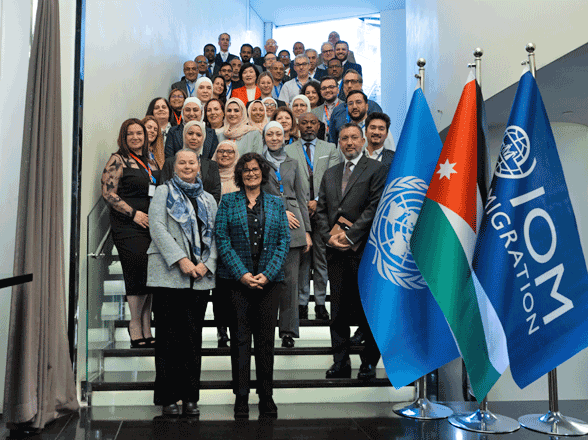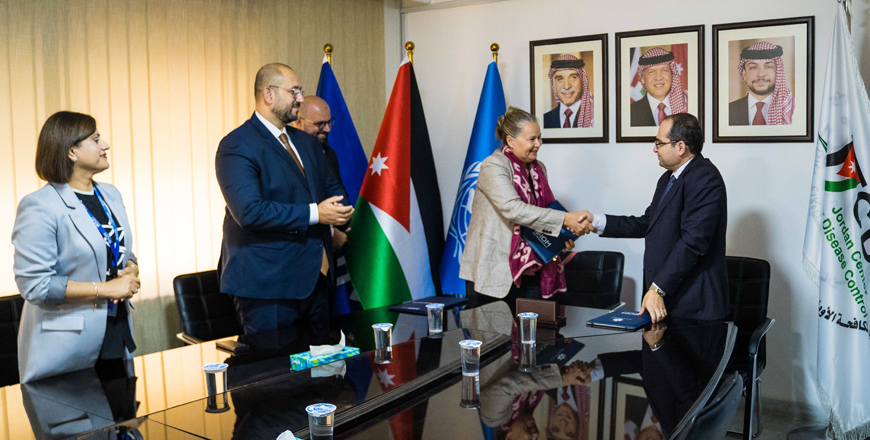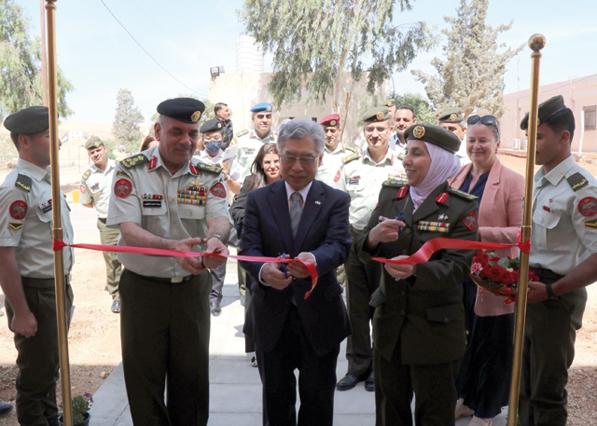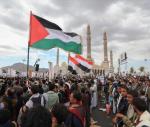You are here
IOM high-level resource mobilisation meeting brings together regional health policymakers in Jordan
By JT - Feb 27,2023 - Last updated at Feb 27,2023

Participants pose for a photo during a high-level regional strategic resource mobilisation meeting in Amman organised by the International Organisation for Migration (Photo courtesy of IMO)
AMMAN — The International Organisation for Migration (IOM)’s Middle East Response (MER) as Principal Recipient (PR) organised a high-level regional strategic resource mobilisation meeting in Amman on February 26 and 27.
The meeting brought together representatives from the Global Fund (GF) and deputy ministers of health from different public health ministries from Jordan, Iraq, Syria, Lebanon, Yemen and Palestinian Territories as well as technical partners, such as WHO, UNAIDS, UNICEF and members of Local Fund Agent, Swiss Tropical and Public Health Institute (TPH), according to an IOM statement.
The meeting offered a platform for the health ministry leadership from the six countries supported by IOM through the GF grant to engage in discussions on how to effectively utilise resources available to countries through the Middle East Response to achieve national goals and the thematic elimination goal or agenda in terms of tuberculosis (TB), HIV and malaria in the Middle East region.
“This high-level meeting of health policymakers from countries covered through the MER along with key partners IOM, UNICEF, WHO and UNAIDS is the first in a series of strategic regional leadership discussions and prioritization of investment to ‘change the game’ and make prevention, control and even elimination of the three diseases a real consideration and agenda in the most challenging operating environments context,”said Emmanuel Olatunji, Fund Portfolio Manager from the Global Fund.
The two-day high-level meeting was opened by the Chief of Mission IOM Jordan, Tajma Kurt.
The national programme managers of the three disease control programmes will convene later in the week with IOM, WHO, UNAIDS and the Global Fund, to review the progress of the ongoing MER implementation, address bottlenecks and identify emerging priorities for the next grant cycle 2025-2027, the statement said.
Jamela Al Raiby, WHO Representative to Jordan, emphasised the need to support the National TB and National AIDS programme in Jordan in their efforts on prevention, control and elimination.
“WHO provided strong technical support to the development of the National Strategic Plan towards TB elimination and introduction of District Health Information Software (DHIS)2 as surveillance platform for TB. We remain committed to continue our support for the benefit of every resident of Jordan,” Raiby said.
“The MER was initially set up as a differentiated response to ensure that supply lines for drugs and diagnostics for the prevention, diagnosis and control of the three diseases were not interrupted due to the humanitarian crisis in the region” said Nevin Wilson, IOM’s Senior Regional Project Coordinator leading the MER.
“It has evolved and consolidated into a strategic investment of the Global Fund demonstrating progress against the three diseases prioritising the most vulnerable populations through partnerships, innovation and collaboration,” Wilson added.
From 2017 until today, the GF has invested over $160 million in MER through three phases and has further allocated $54 million for a fourth phase (2025-2027), bringing the total investment in MER to $215 million. The GF commitments include the fight against the spread of three diseases in the region as well as mitigating the effects of the COVID-19 pandemic.
Between 2017 and 2022, the MER has notified cumulatively 104,120 patients with drug-sensitive tuberculosis and 943 patients with drug-resistant tuberculosis. Cumulatively, 6,132 people living with HIV received antiretroviral therapy through the MER and 218,010 people were able to access voluntary counselling and testing to ascertain their HIV status.
A total of 5,269,738 long-lasting insecticide-treated mosquito nets were distributed to most at-risk populations in Yemen thereby protecting more than 10 million people from malaria, the statement said.
The fund significantly supports building resilient, sustainable system for health (RSSH) through providing mobile vans, X-ray machines, GeneXpert machines and other medical equipment.
The civil society organisations are also involved in the implementation of MER grant and continue to offer catalytic effects to the biomedical interventions related to the three diseases, concluded the statement.
Related Articles
AMMAN — In a significant step towards bolstering healthcare services for migrants and strengthening public health systems, the Jordan Centre
LYON — Governments, philanthropists and private firms pledged just over $14 billion on Thursday for a plan to save 16 million lives, in a bo
AMMAN — The Jordanian Armed Forces-Arab Army (JAF) on Monday celebrated the handover of the Borders Control Department's new administrative



















